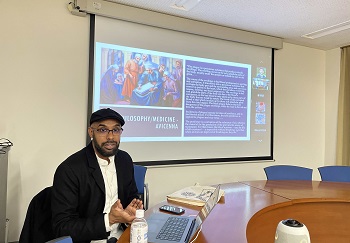Report
On December 20, 2023, the Tobunken Seminar "Science and scripture in classical Islam: an Analysis of Ibn Hajar al-Asqalani's Treatise on the Plague" took place at IASA. Professor Mairaj Syed from the University of California, Davis, delivered a lecture on Ibn Hajar al-Asqalani's treatise on the plague, written during the Mamluk period. Professor Syed classified intellectuals into three types and identified Ibn Hajar as a "synthesizer," the third type of intellectual. He discussed how Ibn Hajar attempted to synthesize knowledge about the plague derived from hadiths, theology, medicine, and others. After the presentation, a lively Q&A session followed, with questions such as whether Ibn Hajar was also a "synthesizer" type in his other works. The workshop was attended by 7 people in person and a further 19 online.
Date and time: December 20, 2023 (Wed), 17:00~19:00
Venue: Institute for Advanced Studies on Asia, 2nd Meeting Room (302)/Zoom
Speaker: Mairaj Syed (UC Davis)
Title: Science and scripture in classical Islam: an Analysis of Ibn Hajar al-Asqalani's Treatise on the Plague
Chair: Jun Akiba (IASA, U Tokyo)
Lecture Abstract:
In the mid-15th century, amidst the aftermath of the Black Plague, the eminent Islamic scholar Ibn Hajar al-'Asqalani composed one of Islam's most influential treatises on the plague, titled Merits of the Plague. Having contracted and survived the disease himself, while losing two children to it, Ibn Hajar aimed to compile and synthesize texts from Islamic scripture, theology, medicine, and law on the plague. This presentation will examine Ibn Hajar's attempts to resolve two key interpretive issues: first, how he synthesized the competing explanations of the plague's origins from theology and medicine; and second, how he reconciled contradictory scriptural texts (hadiths) about the nature of jinns, supernatural beings he believed spread the plague. It will demonstrate how Merits of the Plague exemplifies an important method and aim of scholarship: the coherent balancing and reconciliation of competing truth claims and epistemologies.

